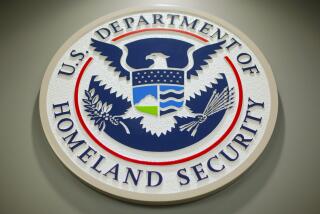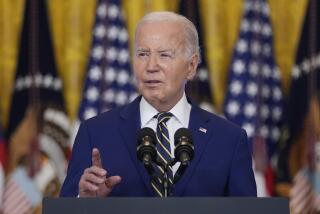Biden administration to lift ‘terrorism’ designation on Cuba

- Share via
WASHINGTON — After years of debate, the Biden administration has notified Congress that it will remove Cuba from the U.S. list of states that sponsor terrorism, a label given the island nation in the last days of the previous Trump presidency.
The decision Tuesday was part of an agreement brokered in part by the Roman Catholic Church to free political prisoners held in Cuba, U.S. officials said.
There is “no credible evidence at this time of ongoing support by Cuba of international terrorism,” a senior administration official told reporters, speaking on condition of anonymity.
Cuba always seemed an odd member of the notorious club, which included Syria and Iran. Most experts and observers of the communist-led nation contended that it did not participate in global terrorism equivalent to the alleged actions of other nations.
The Syrian shrine of Sayeda Zainab drew Iran-backed militiamen from throughout the region. With Assad’s fall, they’ve fled, raising questions about the future of the area — and of the axis.
Former Secretary of State Michael R. Pompeo, in his final week in office under then-President Trump, put Cuba on the list, with little explanation. Being on the “state sponsor of terrorism” list is the blackest of designations for any country.
Many Cuba experts assumed President Biden, once in office, would reverse the designation.
Biden, after all, was vice president during President Obama’s historic opening of ties with Cuba in 2015, reestablishing diplomatic relations and approving numerous trade and travel exchanges. Obama famously traveled to Havana, the first U.S. president to do so in a century, and attended a baseball game with then-President Raul Castro.
Yet, as the years passed, Biden did not move on the Cuba issue. Advocates for better relations protested steadily.
The Times repeatedly asked the State Department why no action was being taken and was told that removal from the list was more complicated than being added to it, and required a more thorough examination.
It is unclear now that such a thorough examination took place.
“In taking these steps to bolster the ongoing dialogue between the government of Cuba and the Catholic Church, President Biden is also honoring the wisdom and counsel that has been provided to him by many world leaders, especially in Latin America, who have encouraged him to take these actions, on how best to advance the human rights of the Cuban people,” White House Press Secretary Karine Jean-Pierre said in a statement.
The Roman Catholic Church has relatively good relations with the Cuban government. U.S. officials said the deal could result in the release of “dozens” of political prisoners, many detained for relatively minor infractions such as protesting in the streets or posting material deemed offensive to the government.
Human rights groups say several hundred people have been jailed by Cuban authorities for a variety of supposed infractions.
He brought human rights to forefront in foreign policy, laid security foundations that have endured.
Havana welcomed Biden’s move, with reservations.
“This is a decision that points in the right direction,” the Cuban Foreign Ministry said in a statement.
Cuba has long demanded an end of the U.S. embargo that officials there say cuts off food, supplies, trade and other business.
It is unclear how long this new status will last. Trump, who takes office again next week, has tapped Florida Sen. Marco Rubio as his secretary of State, and he is likely to be approved. Rubio, son of Cuban immigrants, is expected to take an especially hard line on Cuba and might quickly attempt to reverse the terrorism designation.
Trump has also appointed Mauricio Claver-Carone, a former White House National Security Council aide who also supports tough sanctions against Cuba, to be his special envoy to Latin America.
Numerous U.S. agricultural enterprises continue to do business with Cuba and have long lobbied for trade restrictions to be eased.
More to Read
Get the L.A. Times Politics newsletter
Deeply reported insights into legislation, politics and policy from Sacramento, Washington and beyond. In your inbox three times per week.
You may occasionally receive promotional content from the Los Angeles Times.













